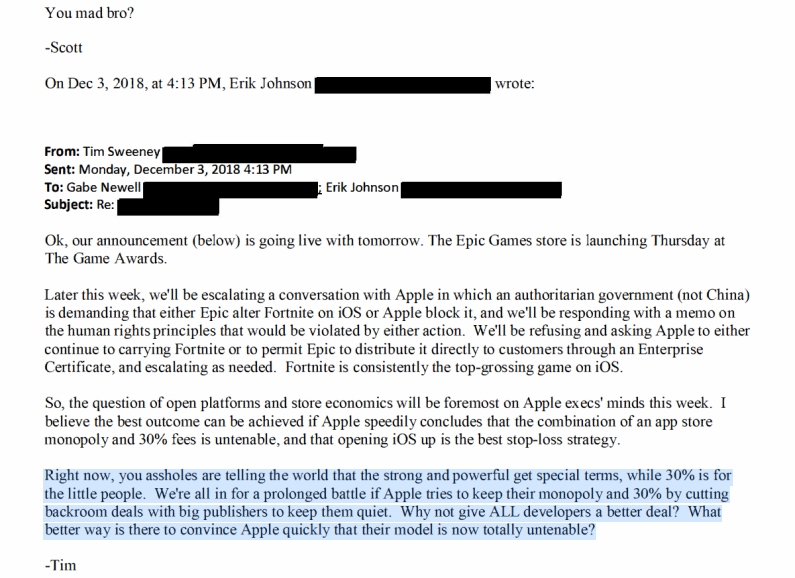Tim Sweeney unleashes most Sweeney-esque tirade against Valve over Steam's 30% cut in newly released 2018 emails
Some of you may remember an antitrust lawsuit against Valve filed by Wolfire Games back in 2021. The court case recently entered a new phase, revealing some internal data, including never-before-seen emails from Epic Games CEO Tim Sweeney.

Tim Sweeney (Image credit: Unreal Engine’s YouTube channel)
Wolfire, which initially accused Valve of usurpering the PC games market, monopolizing it, and killing competition by enforcing pricing parity, decided to turn the case into a class action. The lawsuit has now entered the discovery phase, meaning that many documents (both redacted and not) like witness testimonies and internal correspondence are becoming public.
Simon Carless examined the data in the latest GameDiscoverCo newsletter, focusing on several emails between Epic Games CEO Tim Sweeney and three Valve execs — CEO Gabe Newell, COO Scott Lynch, and project manager Erik Johnson.
The first email chain, dating back to August 2017, starts with Newell asking Sweeney, “Anything we doing to annoy you?” The Valve head suggested that Sean Jenkins’ “public dumbness mith be part of it,” referring to a post from Jenkins about limiting the issue of Steam keys.
Sweeney replied that he has “never heard of Sean Jenkins,” going on a rant about 30% platform cuts. He said they were no longer justifiable, trying to encourage Valve to reduce the fees. “If you subtract out the top 25 games on Steam, I bet Valve made moreprofit from most of the next 1000 than the developer themselves made,” the Epic Games CEO noted.
Another unredacted correspondence released as part of the Wolfire v. Valve case took place between November 26, 2018 and December 4, 2018. Mailing Newell and Johnson, Sweeney hinted at the upcoming announcement of the Epic Games Store, Steam’s direct competitor, and its main USP being a “permanent 88%/12% revenue split.”
He went on to discuss what he called “Apple’s antitrust practices” (long before the Epic v. Apple lawsuit), urging Valve to improve its Steam policies and make better conditions for developers of all sizes. Ending his email, Sweeney noted that he would be very disappointed to see Valve making “unannounced revenue-sharing changes that favored big publishers over indies.”
On November 30, 2018, Steam introduced a new revenue split, decreasing the 30% cut to 25% for all sales between $10 million and $50 million and to $20% for revenue above $50 million.
That’s when Sweeney got really mad, criticizing Valve’s move and writing on December 3 that the best outcome for open platforms would be if “Apple speedily concludes that the combination of an app store monopoly and 30% fees is untenable, and that opening iOS up is the best stop-loss strategy.”
He ended his email with the following rant: “Right now, you assholes are telling the world that the strong and powerful get special terms, while 30% is for the little people. We’re all in for a prolonged battle if Apple tries to keep their monopoly and 30% by cutting backroom deals with big publishers to keep them quiet. Why not give ALL developers a better deal? What better way is there to convince Apple quickly that their model is now totally untenable?”
On December 4, Valve’s Scott Lynch mailed Newell and Johnson with a one-line reaction to Sweeney’s message: “You mad bro?”

At the time, Valve’s decision to lower platform fees for the highest-grossing games was clearly an attempt to keep major publishers, who were trying to open their own storefronts and launchers avoid paying the 30% cut from each purchase, on Steam. Although the company has never changed its policies since then, Steam is now in a better position than ever both, remaining the largest platform for PC games both in terms of the number of users and opportunities for developers and publishers of all sizes.
In any case, seeing Tim Sweeney tease Valve with the announcement of a direct rival to Steam and then call the company “assholes” for not changing its economics is both wild and very Sweeney-esque, given his stance and commitment to his long-lasting antitrust crusade.
Check out Simon Carless’ full post for more details and background on the Wolfire v. Valve case.